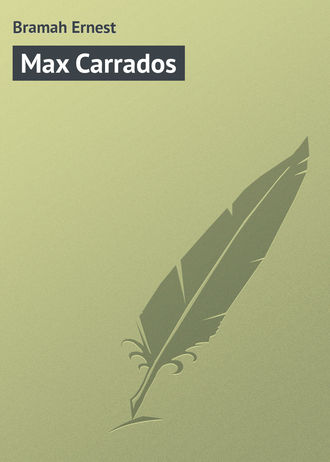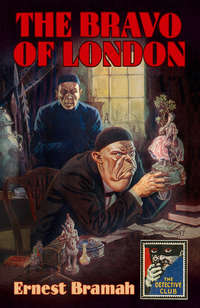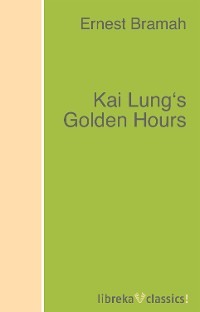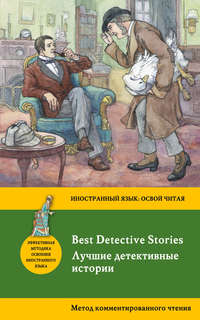 полная версия
полная версияMax Carrados
“No; I have come on Mr Carlyle’s behalf,” replied Carrados, walking to a chair as though he moved by a kind of instinct.
Hutchins laughed his wry contempt.
“Mr Carlyle!” he reiterated; “Mr Carlyle! Fat lot of good he’s been. Why don’t he do something for his money?”
“He has,” replied Carrados, with imperturbable good-humour; “he has sent me. Now, I want to ask you a few questions.”
“A few questions!” roared the irate man. “Why, blast it, I have done nothing else but answer questions for a month. I didn’t pay Mr Carlyle to ask me questions; I can get enough of that for nixes. Why don’t you go and ask Mr Herbert Ananias Mead your few questions – then you might find out something.”
There was a slight movement by the door and Carrados knew that the girl had quietly left the room.
“You saw that, sir?” demanded the father, diverted to a new line of bitterness. “You saw that girl – my own daughter, that I’ve worked for all her life?”
“No,” replied Carrados.
“The girl that’s just gone out – she’s my daughter,” explained Hutchins.
“I know, but I did not see her. I see nothing. I am blind.”
“Blind!” exclaimed the old fellow, sitting up in startled wonderment. “You mean it, sir? You walk all right and you look at me as if you saw me. You’re kidding surely.”
“No,” smiled Carrados. “It’s quite right.”
“Then it’s a funny business, sir – you what are blind expecting to find something that those with their eyes couldn’t,” ruminated Hutchins sagely.
“There are things that you can’t see with your eyes, Hutchins.”
“Perhaps you are right, sir. Well, what is it you want to know?”
“Light a cigar first,” said the blind man, holding out his case and waiting until the various sounds told him that his host was smoking contentedly. “The train you were driving at the time of the accident was the six-twenty-seven from Notcliff. It stopped everywhere until it reached Lambeth Bridge, the chief London station of your line. There it became something of an express, and leaving Lambeth Bridge at seven-eleven, should not stop again until it fetched Swanstead on Thames, eleven miles out, at seven-thirty-four. Then it stopped on and off from Swanstead to Ingerfield, the terminus of that branch, which it reached at eight-five.”
Hutchins nodded, and then, remembering, said: “That’s right, sir.”
“That was your business all day – running between Notcliff and Ingerfield?”
“Yes, sir. Three journeys up and three down mostly.”
“With the same stops on all the down journeys?”
“No. The seven-eleven is the only one that does a run from the Bridge to Swanstead. You see, it is just on the close of the evening rush, as they call it. A good many late business gentlemen living at Swanstead use the seven-eleven regular. The other journeys we stop at every station to Lambeth Bridge, and then here and there beyond.”
“There are, of course, other trains doing exactly the same journey – a service, in fact?”
“Yes, sir. About six.”
“And do any of those – say, during the rush – do any of those run non-stop from Lambeth to Swanstead?”
Hutchins reflected a moment. All the choler and restlessness had melted out of the man’s face. He was again the excellent artisan, slow but capable and self-reliant.
“That I couldn’t definitely say, sir. Very few short-distance trains pass the junction, but some of those may. A guide would show us in a minute but I haven’t got one.”
“Never mind. You said at the inquest that it was no uncommon thing for you to be pulled up at the ‘stop’ signal east of Knight’s Cross Station. How often would that happen – only with the seven-eleven, mind.”
“Perhaps three times a week; perhaps twice.”
“The accident was on a Thursday. Have you noticed that you were pulled up oftener on a Thursday than on any other day?”
A smile crossed the driver’s face at the question.
“You don’t happen to live at Swanstead yourself, sir?” he asked in reply.
“No,” admitted Carrados. “Why?”
“Well, sir, we were always pulled up on Thursday; practically always, you may say. It got to be quite a saying among those who used the train regular; they used to look out for it.”
Carrados’s sightless eyes had the one quality of concealing emotion supremely. “Oh,” he commented softly, “always; and it was quite a saying, was it? And why was it always so on Thursday?”
“It had to do with the early closing, I’m told. The suburban traffic was a bit different. By rights we ought to have been set back two minutes for that day, but I suppose it wasn’t thought worth while to alter us in the time-table, so we most always had to wait outside Three Deep tunnel for a west-bound electric to make good.”
“You were prepared for it then?”
“Yes, sir, I was,” said Hutchins, reddening at some recollection, “and very down about it was one of the jury over that. But, mayhap once in three months, I did get through even on a Thursday, and it’s not for me to question whether things are right or wrong just because they are not what I may expect. The signals are my orders, sir – stop! go on! and it’s for me to obey, as you would a general on the field of battle. What would happen otherwise! It was nonsense what they said about going cautious; and the man who started it was a barber who didn’t know the difference between a ‘distance’ and a ‘stop’ signal down to the minute they gave their verdict. My orders, sir, given me by that signal, was ‘Go right ahead and keep to your running time!’”
Carrados nodded a soothing assent. “That is all, I think,” he remarked.
“All!” exclaimed Hutchins in surprise. “Why, sir, you can’t have got much idea of it yet.”
“Quite enough. And I know it isn’t pleasant for you to be taken along the same ground over and over again.”
The man moved awkwardly in his chair and pulled nervously at his grizzled beard.
“You mustn’t take any notice of what I said just now, sir,” he apologized. “You somehow make me feel that something may come of it; but I’ve been badgered about and accused and cross-examined from one to another of them these weeks till it’s fairly made me bitter against everything. And now they talk of putting me in a lavatory – me that has been with the company for five and forty years and on the foot-plate thirty-two – a man suspected of running past a danger signal.”
“You have had a rough time, Hutchins; you will have to exercise your patience a little longer yet,” said Carrados sympathetically.
“You think something may come of it, sir? You think you will be able to clear me? Believe me, sir, if you could give me something to look forward to it might save me from – ” He pulled himself up and shook his head sorrowfully. “I’ve been near it,” he added simply.
Carrados reflected and took his resolution.
“To-day is Wednesday. I think you may hope to hear something from your general manager towards the middle of next week.”
“Good God, sir! You really mean that?”
“In the interval show your good sense by behaving reasonably. Keep civilly to yourself and don’t talk. Above all” – he nodded towards a quart jug that stood on the table between them, an incident that filled the simple-minded engineer with boundless wonder when he recalled it afterwards – “above all, leave that alone.”
Hutchins snatched up the vessel and brought it crashing down on the hearthstone, his face shining with a set resolution.
“I’ve done with it, sir. It was the bitterness and despair that drove me to that. Now I can do without it.”
The door was hastily opened and Miss Hutchins looked anxiously from her father to the visitors and back again.
“Oh, whatever is the matter?” she exclaimed. “I heard a great crash.”
“This gentleman is going to clear me, Meg, my dear,” blurted out the old man irrepressibly. “And I’ve done with the drink for ever.”
“Hutchins! Hutchins!” said Carrados warningly.
“My daughter, sir; you wouldn’t have her not know?” pleaded Hutchins, rather crest-fallen. “It won’t go any further.”
Carrados laughed quietly to himself as he felt Margaret Hutchins’s startled and questioning eyes attempting to read his mind. He shook hands with the engine-driver without further comment, however, and walked out into the commonplace little street under Parkinson’s unobtrusive guidance.
“Very nice of Miss Hutchins to go into half-mourning, Parkinson,” he remarked as they went along. “Thoughtful, and yet not ostentatious.”
“Yes, sir,” agreed Parkinson, who had long ceased to wonder at his master’s perceptions.
“The Romans, Parkinson, had a saying to the effect that gold carries no smell. That is a pity sometimes. What jewellery did Miss Hutchins wear?”
“Very little, sir. A plain gold brooch representing a merry-thought – the merry-thought of a sparrow, I should say, sir. The only other article was a smooth-backed gun-metal watch, suspended from a gun-metal bow.”
“Nothing showy or expensive, eh?”
“Oh dear no, sir. Quite appropriate for a young person of her position.”
“Just what I should have expected.” He slackened his pace. “We are passing a hoarding, are we not?”
“Yes, sir.”
“We will stand here a moment. Read me the letterpress of the poster before us.”
“This ‘Oxo’ one, sir?”
“Yes.”
“‘Oxo,’ sir.”
Carrados was convulsed with silent laughter. Parkinson had infinitely more dignity and conceded merely a tolerant recognition of the ludicrous.
“That was a bad shot, Parkinson,” remarked his master when he could speak. “We will try another.”
For three minutes, with scrupulous conscientiousness on the part of the reader and every appearance of keen interest on the part of the hearer, there were set forth the particulars of a sale by auction of superfluous timber and builders’ material.
“That will do,” said Carrados, when the last detail had been reached. “We can be seen from the door of No. 107 still?”
“Yes, sir.”
“No indication of anyone coming to us from there?”
“No, sir.”
Carrados walked thoughtfully on again. In the Holloway Road they rejoined the waiting motor car. “Lambeth Bridge Station,” was the order the driver received.
From the station the car was sent on home and Parkinson was instructed to take two first-class singles for Richmond, which could be reached by changing at Stafford Road. The “evening rush” had not yet commenced and they had no difficulty in finding an empty carriage when the train came in.
Parkinson was kept busy that journey describing what he saw at various points between Lambeth Bridge and Knight’s Cross. For a quarter of a mile Carrados’s demands on the eyes and the memory of his remarkable servant were wide and incessant. Then his questions ceased. They had passed the “stop” signal, east of Knight’s Cross Station.
The following afternoon they made the return journey as far as Knight’s Cross. This time, however, the surroundings failed to interest Carrados. “We are going to look at some rooms,” was the information he offered on the subject, and an imperturbable “Yes, sir” had been the extent of Parkinson’s comment on the unusual proceeding. After leaving the station they turned sharply along a road that ran parallel with the line, a dull thoroughfare of substantial, elderly houses that were beginning to sink into decrepitude. Here and there a corner residence displayed the brass plate of a professional occupant, but for the most part they were given up to the various branches of second-rate apartment letting.
“The third house after the one with the flagstaff,” said Carrados.
Parkinson rang the bell, which was answered by a young servant, who took an early opportunity of assuring them that she was not tidy as it was rather early in the afternoon. She informed Carrados, in reply to his inquiry, that Miss Chubb was at home, and showed them into a melancholy little sitting-room to await her appearance.
“I shall be ‘almost’ blind here, Parkinson,” remarked Carrados, walking about the room. “It saves explanation.”
“Very good, sir,” replied Parkinson.
Five minutes later, an interval suggesting that Miss Chubb also found it rather early in the afternoon, Carrados was arranging to take rooms for his attendant and himself for the short time that he would be in London, seeing an oculist.
“One bedroom, mine, must face north,” he stipulated. “It has to do with the light.”
Miss Chubb replied that she quite understood. Some gentlemen, she added, had their requirements, others their fancies. She endeavoured to suit all. The bedroom she had in view from the first did face north. She would not have known, only the last gentleman, curiously enough, had made the same request.
“A sufferer like myself?” inquired Carrados affably.
Miss Chubb did not think so. In his case she regarded it merely as a fancy. He had said that he could not sleep on any other side. She had had to turn out of her own room to accommodate him, but if one kept an apartment-house one had to be adaptable; and Mr Ghoosh was certainly very liberal in his ideas.
“Ghoosh? An Indian gentleman, I presume?” hazarded Carrados.
It appeared that Mr Ghoosh was an Indian. Miss Chubb confided that at first she had been rather perturbed at the idea of taking in “a black man,” as she confessed to regarding him. She reiterated, however, that Mr Ghoosh proved to be “quite the gentleman.” Five minutes of affability put Carrados in full possession of Mr Ghoosh’s manner of life and movements – the dates of his arrival and departure, his solitariness and his daily habits.
“This would be the best bedroom,” said Miss Chubb.
It was a fair-sized room on the first floor. The window looked out on to the roof of an outbuilding; beyond, the deep cutting of the railway line. Opposite stood the dead wall that Mr Carlyle had spoken of.
Carrados “looked” round the room with the discriminating glance that sometimes proved so embarrassing to those who knew him.
“I have to take a little daily exercise,” he remarked, walking to the window and running his hand up the woodwork. “You will not mind my fixing a ‘developer’ here, Miss Chubb – a few small screws?”
Miss Chubb thought not. Then she was sure not. Finally she ridiculed the idea of minding with scorn.
“If there is width enough,” mused Carrados, spanning the upright critically. “Do you happen to have a wooden foot-rule convenient?”
“Well, to be sure!” exclaimed Miss Chubb, opening a rapid succession of drawers until she produced the required article. “When we did out this room after Mr Ghoosh, there was this very ruler among the things that he hadn’t thought worth taking. This is what you require, sir?”
“Yes,” replied Carrados, accepting it, “I think this is exactly what I require.” It was a common new white-wood rule, such as one might buy at any small stationer’s for a penny. He carelessly took off the width of the upright, reading the figures with a touch; and then continued to run a finger-tip delicately up and down the edges of the instrument.
“Four and seven-eighths,” was his unspoken conclusion.
“I hope it will do, sir.”
“Admirably,” replied Carrados. “But I haven’t reached the end of my requirements yet, Miss Chubb.”
“No, sir?” said the landlady, feeling that it would be a pleasure to oblige so agreeable a gentleman, “what else might there be?”
“Although I can see very little I like to have a light, but not any kind of light. Gas I cannot do with. Do you think that you would be able to find me an oil lamp?”
“Certainly, sir. I got out a very nice brass lamp that I have specially for Mr Ghoosh. He read a good deal of an evening and he preferred a lamp.”
“That is very convenient. I suppose it is large enough to burn for a whole evening?”
“Yes, indeed. And very particular he was always to have it filled every day.”
“A lamp without oil is not very useful,” smiled Carrados, following her towards another room, and absentmindedly slipping the foot-rule into his pocket.
Whatever Parkinson thought of the arrangement of going into second-rate apartments in an obscure street it is to be inferred that his devotion to his master was sufficient to overcome his private emotions as a self-respecting “man.” At all events, as they were approaching the station he asked, and without a trace of feeling, whether there were any orders for him with reference to the proposed migration.
“None, Parkinson,” replied his master. “We must be satisfied with our present quarters.”
“I beg your pardon, sir,” said Parkinson, with some constraint. “I understood that you had taken the rooms for a week certain.”
“I am afraid that Miss Chubb will be under the same impression. Unforeseen circumstances will prevent our going, however. Mr Greatorex must write to-morrow, enclosing a cheque, with my regrets, and adding a penny for this ruler which I seem to have brought away with me. It, at least, is something for the money.”
Parkinson may be excused for not attempting to understand the course of events.
“Here is your train coming in, sir,” he merely said.
“We will let it go and wait for another. Is there a signal at either end of the platform?”
“Yes, sir; at the further end.”
“Let us walk towards it. Are there any of the porters or officials about here?”
“No, sir; none.”
“Take this ruler. I want you to go up the steps – there are steps up the signal, by the way?”
“Yes, sir.”
“I want you to measure the glass of the lamp. Do not go up any higher than is necessary, but if you have to stretch be careful not to mark on the measurement with your nail, although the impulse is a natural one. That has been done already.”
Parkinson looked apprehensively around and about. Fortunately the part was a dark and unfrequented spot and everyone else was moving towards the exit at the other end of the platform. Fortunately, also, the signal was not a high one.
“As near as I can judge on the rounded surface, the glass is four and seven-eighths across,” reported Parkinson.
“Thank you,” replied Carrados, returning the measure to his pocket, “four and seven-eighths is quite near enough. Now we will take the next train back.”
Sunday evening came, and with it Mr Carlyle to The Turrets at the appointed hour. He brought to the situation a mind poised for any eventuality and a trenchant eye. As the time went on and the impenetrable Carrados made no allusion to the case, Carlyle’s manner inclined to a waggish commiseration of his host’s position. Actually, he said little, but the crisp precision of his voice when the path lay open to a remark of any significance left little to be said.
It was not until they had finished dinner and returned to the library that Carrados gave the slightest hint of anything unusual being in the air. His first indication of coming events was to remove the key from the outside to the inside of the door.
“What are you doing, Max?” demanded Mr Carlyle, his curiosity overcoming the indirect attitude.
“You have been very entertaining, Louis,” replied his friend, “but Parkinson should be back very soon now and it is as well to be prepared. Do you happen to carry a revolver?”
“Not when I come to dine with you, Max,” replied Carlyle, with all the aplomb he could muster. “Is it usual?”
Carrados smiled affectionately at his guest’s agile recovery and touched the secret spring of a drawer in an antique bureau by his side. The little hidden receptacle shot smoothly out, disclosing a pair of dull-blued pistols.
“To-night, at all events, it might be prudent,” he replied, handing one to Carlyle and putting the other into his own pocket. “Our man may be here at any minute, and we do not know in what temper he will come.”
“Our man!” exclaimed Carlyle, craning forward in excitement. “Max! you don’t mean to say that you have got Mead to admit it?”
“No one has admitted it,” said Carrados. “And it is not Mead.”
“Not Mead… Do you mean that Hutchins – ?”
“Neither Mead nor Hutchins. The man who tampered with the signal – for Hutchins was right and a green light was exhibited – is a young Indian from Bengal. His name is Drishna and he lives at Swanstead.”
Mr Carlyle stared at his friend between sheer surprise and blank incredulity.
“You really mean this, Carrados?” he said.
“My fatal reputation for humour!” smiled Carrados. “If I am wrong, Louis, the next hour will expose it.”
“But why – why – why? The colossal villainy, the unparalleled audacity!” Mr Carlyle lost himself among incredulous superlatives and could only stare.
“Chiefly to get himself out of a disastrous speculation,” replied Carrados, answering the question. “If there was another motive – or at least an incentive – which I suspect, doubtless we shall hear of it.”
“All the same, Max, I don’t think that you have treated me quite fairly,” protested Carlyle, getting over his first surprise and passing to a sense of injury. “Here we are and I know nothing, absolutely nothing, of the whole affair.”
“We both have our ideas of pleasantry, Louis,” replied Carrados genially. “But I dare say you are right and perhaps there is still time to atone.” In the fewest possible words he outlined the course of his investigations. “And now you know all that is to be known until Drishna arrives.”
“But will he come?” questioned Carlyle doubtfully. “He may be suspicious.”
“Yes, he will be suspicious.”
“Then he will not come.”
“On the contrary, Louis, he will come because my letter will make him suspicious. He is coming; otherwise Parkinson would have telephoned me at once and we should have had to take other measures.”
“What did you say, Max?” asked Carlyle curiously.
“I wrote that I was anxious to discuss an Indo-Scythian inscription with him, and sent my car in the hope that he would be able to oblige me.”
“But is he interested in Indo-Scythian inscriptions?”
“I haven’t the faintest idea,” admitted Carrados, and Mr Carlyle was throwing up his hands in despair when the sound of a motor car wheels softly kissing the gravel surface of the drive outside brought him to his feet.
“By gad, you are right, Max!” he exclaimed, peeping through the curtains. “There is a man inside.”
“Mr Drishna,” announced Parkinson, a minute later.
The visitor came into the room with leisurely self-possession that might have been real or a desperate assumption. He was a slightly built young man of about twenty-five, with black hair and eyes, a small, carefully trained moustache, and a dark olive skin. His physiognomy was not displeasing, but his expression had a harsh and supercilious tinge. In attire he erred towards the immaculately spruce.
“Mr Carrados?” he said inquiringly.
Carrados, who had risen, bowed slightly without offering his hand.
“This gentleman,” he said, indicating his friend, “is Mr Carlyle, the celebrated private detective.”
The Indian shot a very sharp glance at the object of this description. Then he sat down.
“You wrote me a letter, Mr Carrados,” he remarked, in English that scarcely betrayed any foreign origin, “a rather curious letter, I may say. You asked me about an ancient inscription. I know nothing of antiquities; but I thought, as you had sent, that it would be more courteous if I came and explained this to you.”
“That was the object of my letter,” replied Carrados.
“You wished to see me?” said Drishna, unable to stand the ordeal of the silence that Carrados imposed after his remark.
“When you left Miss Chubb’s house you left a ruler behind.” One lay on the desk by Carrados and he took it up as he spoke.
“I don’t understand what you are talking about,” said Drishna guardedly. “You are making some mistake.”
“The ruler was marked at four and seven-eighths inches – the measure of the glass of the signal lamp outside.”
The unfortunate young man was unable to repress a start. His face lost its healthy tone. Then, with a sudden impulse, he made a step forward and snatched the object from Carrados’s hand.
“If it is mine I have a right to it,” he exclaimed, snapping the ruler in two and throwing it on to the back of the blazing fire. “It is nothing.”
“Pardon me, I did not say that the one you have so impetuously disposed of was yours. As a matter of fact, it was mine. Yours is – elsewhere.”
“Wherever it is you have no right to it if it is mine,” panted Drishna, with rising excitement. “You are a thief, Mr Carrados. I will not stay any longer here.”





